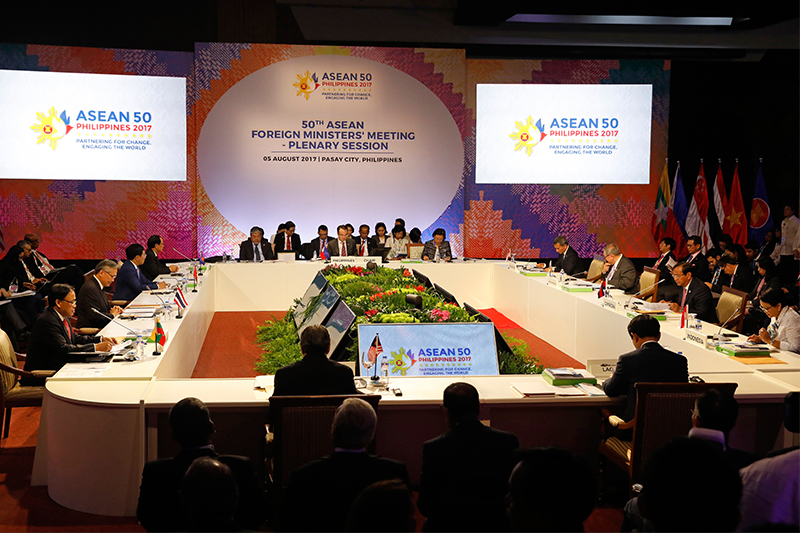Commentary: Counting milestones for ASEAN

ASEAN Foreign Ministers take part in a meeting of the 50th Association of Southeast Asia Nations (ASEAN) Regional Forum in Manila, Philippines, Saturday, Aug. 5, 2017. Alarm over North Korea's intercontinental ballistic missile tests, a tentative step to temper South China Sea disputes and unease over a disastrous siege by pro-Islamic State group militants will grab the spotlight in an annual gathering of Southeast Asia's top diplomats with their Asian and Western counterparts. Erik De Castro/Pool Photo via AP
MANILA, Philippines (First published August 11, 2017, 9:50 a.m.) — It’s a milestone anniversary for the Association of Southeast Asian Nations this year and the level of public interest is especially high because of the continuing developments in the South China Sea. Though Philippine diplomacy may have turned quieter in the past year, for months the regional papers have reported on the souring relations between China and Vietnam. The latest spat has to do with the right to explore an oil block disputed by the two countries.
The cast of characters may have changed—the Philippines having demoted itself to a supporting role—but the region’s stakes over the South China Sea disputes remain as high as ever. Moreover, as these developments continue, ASEAN’s efforts could have a lasting effect on the political-security realities of our region. It is for this reason, after all, that the ASEAN statements are an annually contested process. Many will remember that after heated discussions in 2012, ASEAN failed to produce a statement at all.
Loud voices, quiet voices
Vietnam’s temperature is running the highest this year, and so the country was the focus of most news reporting on the Foreign Ministers’ meeting last week. The sense is that Vietnam, which has had been unhappy with the original language of the communiqué. China was obviously unhappy with this behavior, calling off a planned bilateral meeting between the foreign ministers. Xinhua News ran a commentary on Monday telling Vietnam to “readjust its attitude.”
Unfortunately, most ASEAN countries kept a low profile last week, leaving extra-regional states to garner plenty of attention. The US, Australia and Japan came to a common position on the developments in the South China Sea. Their statement regards the 2016 Hague ruling as legally binding and also calls for a binding code of conduct in the South China Sea. These are not novel positions on the part of these countries, but the consonance of the three parties on these three points strikes an emphatic chord at a time when most ASEAN ministers are taking a more careful path.
Binding, not binding
In terms of content, we had hoped for the communiqué or the framework to say the ASEAN stand that the eventual code of conduct will be legally binding. This was supposedly the preference of the foreign ministers. If this had been a universal preference, it would have been nice to see this in the joint statement. In any case, the legally binding character of the code of conduct is important, and in an ideal scenario this would have been agreed upon even before the negotiations begin.
If the region is after a statement of principle, it already has the 2002 Declaration on the Conduct of Parties to lean on. As the ASEAN secretary-general pointed out in an interview, "The [Declaration on the Conduct of Parties in the South China Sea] has never been fully and effectively implemented…. The new code of conduct, for it to have any significance or importance, it would have to be a legally binding document."
As our grouping works towards new milestones, we should be careful not to count only the number of documents signed but take care in evaluating their contents to the extent that is possible. Southeast Asia needs fewer paper promises and more weighty commitments.
Angelica Mangahas is deputy executive director of the Stratbase Albert Del Rosario Institute (ADRi) and a lecturer with the International Studies department of De La Salle University in Manila. She completed her master’s degree in Security Studies at Georgetown University. Her writing and advocacy experience spans multiple international humanitarian and diplomatic organizations. Her current research focuses on Philippine and regional security concerns.
- Latest

























